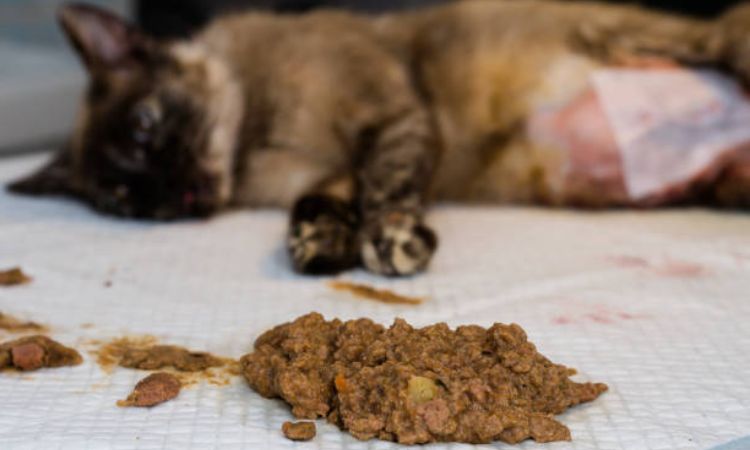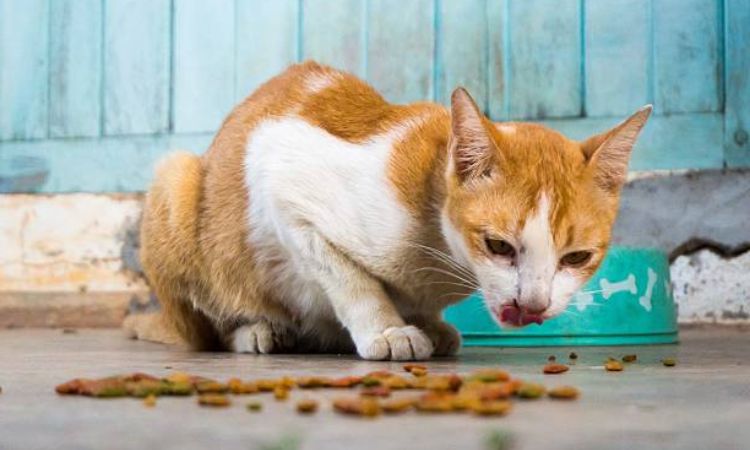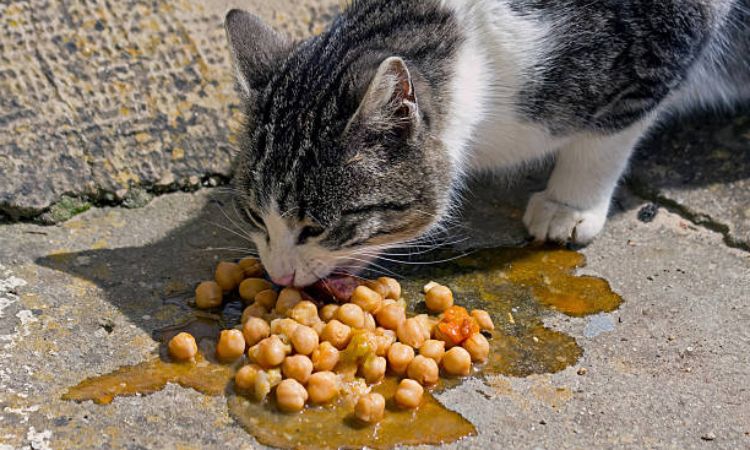Many cat owners often confuse vomiting with regurgitation, even though they are two very different things. This subtle distinction can actually make a big difference when it comes to diagnosing the issue and deciding on the right care plan.
If your cat is throwing up undigested food but still seems perfectly fine otherwise, it’s important to know what might really be going on. In this article, Nexus-pets will walk you through the possible reasons behind this behavior and what you can do about it.

Common Causes of Vomiting Undigested Food in Cats Who Are Otherwise Normal
1. Eating Habits
Cats that eat too quickly or gulp down their meals can overwhelm their stomachs, leading to the regurgitation of undigested food shortly after eating. Similarly, providing excessively large meals at once may stretch the stomach and trigger vomiting.
- Practical Solutions: Use slow feeder bowls or puzzle feeders to encourage more deliberate eating, and divide the cat’s daily food intake into smaller, more frequent meals to reduce digestive stress.
2. Dietary Causes
Certain ingredients in a cat’s food may cause sensitivities or intolerances, resulting in stomach irritation and vomiting. Sudden changes in diet, introduction of new food, or low-quality and spoiled food can exacerbate these issues. Even refrigerated wet food served cold may sometimes lead to mild digestive upset.
- Tips: Gradually transition to new diets over a week or more, and consider hypoallergenic or easily digestible foods under veterinary guidance to prevent recurring vomiting episodes.
3. Hairballs and Minor Gastrointestinal Irritations
Ingested hair during grooming, especially in long-haired cats, can form hairballs that irritate the stomach or partially block the digestive tract, causing vomiting. Mild gastritis or temporary stomach upset can also lead to the expulsion of undigested food.
- Prevention: Regular brushing reduces ingested fur, while hairball-specific diets, lubricants, or supplements can help hair pass safely through the digestive system.
4. Stress and Environmental Factors
Cats are highly sensitive to changes in their environment. Stressors such as moving to a new home, adding a new pet, or alterations to their routine can upset the digestive system, sometimes leading to vomiting even in otherwise healthy cats.
- Management: Maintain consistent feeding times, create calm and secure spaces for your cat, and consider stress-relief aids like pheromone diffusers or interactive toys to reduce anxiety-induced digestive issues.

Potential Medical Causes That Require Veterinary Attention
While occasional vomiting of undigested food may be harmless in some cats, frequent or persistent episodes could indicate an underlying medical condition that warrants a veterinarian’s evaluation. Here are the most common medical causes that may require professional care:
1. Gastrointestinal Diseases
Conditions such as gastritis, inflammatory bowel disease (IBD), or pancreatitis can irritate the stomach lining and digestive tract, preventing proper digestion and causing vomiting. Cats with these disorders may appear otherwise normal between episodes, but repeated vomiting can lead to dehydration, weight loss, and nutrient deficiencies. Early veterinary diagnosis and tailored treatment—including dietary modifications, medications, or enzyme supplements—are essential to manage these conditions effectively.
2. Intestinal Obstruction
Vomiting can occur if the digestive tract is blocked by hairballs, swallowed strings, small toys, or other foreign objects. Even partial obstructions can prevent normal digestion, leading to repeated regurgitation of undigested food. Obstructions are often serious and may require imaging studies such as X-rays or ultrasounds, and in some cases, surgical intervention to remove the blockage safely.
3. Systemic Illnesses
Certain systemic or metabolic diseases can affect digestion and trigger vomiting. Common examples include kidney disease, hyperthyroidism (overactive thyroid), and diabetes. These conditions may present subtle early signs such as increased thirst, changes in appetite, or mild weight loss before vomiting becomes frequent. Comprehensive blood work and urinalysis are typically necessary for accurate diagnosis, followed by condition-specific treatment to prevent complications.
4. Parasites and Infections
Internal parasites, such as worms, and infectious diseases like feline panleukopenia or heartworm can disrupt the gastrointestinal system, causing nausea and vomiting. Veterinary evaluation often includes fecal testing, blood work, and sometimes imaging to detect parasites or infectious agents. Timely treatment with antiparasitic or antibiotic therapy is important to resolve the underlying infection and prevent further digestive upset.
Behavioral Signs to Monitor Alongside Vomiting
Observing your cat’s behavior alongside vomiting can reveal important health clues. Even mild or occasional vomiting may signal an underlying issue when paired with behavioral changes.
- Appetite and Eating Habits: A decrease in appetite, refusal to eat, or sudden changes in food preferences may indicate your cat is unwell. Tracking eating habits helps your veterinarian spot patterns and triggers.
- Energy and Activity Levels: Lethargy, hiding, or reduced play can accompany vomiting, signaling discomfort or illness. Cats may withdraw from interaction with family or other pets.
- Litter Box Habits and Weight: Diarrhea, constipation, accidents, or unexplained weight loss alongside vomiting are red flags that warrant prompt veterinary evaluation.
By keeping a careful eye on these behavioral signs, pet owners can provide valuable information to their veterinarian, helping to identify the root cause of vomiting and ensure timely and effective treatment. Even subtle changes in appetite, energy, or litter box habits can be meaningful indicators of your cat’s health.

When to See a Veterinarian
While occasional vomiting in cats can be relatively harmless, knowing when to seek veterinary care is crucial for your cat’s health.
Frequency and Duration of Vomiting
- Vomiting once or twice may not be alarming, especially if your cat behaves normally afterward.
- Repeated vomiting—more than a few times a month, or persistent vomiting over 24–48 hours—requires veterinary evaluation. Chronic or frequent episodes can indicate underlying gastrointestinal issues, food intolerances, or other systemic conditions.
Presence of Additional Symptoms
- Blood in vomit, dark coffee-ground-like vomit, or a foul odor may signal serious gastrointestinal bleeding or ulcers.
- Signs of abdominal pain, bloating, or a tender stomach should never be ignored.
- Difficulty breathing, excessive drooling, or signs of dehydration (sunken eyes, lethargy, reduced skin elasticity) are also red flags.
Sudden or Severe Symptoms Requiring Emergency Care
- If your cat vomits repeatedly within a short period, becomes extremely lethargic, collapses, or shows signs of shock, immediate emergency veterinary care is necessary.
- Ingesting toxic substances, foreign objects, or spoiled food can also provoke acute emergencies that require urgent intervention.
Monitoring these factors ensures that vomiting is addressed appropriately, and any serious underlying condition is treated promptly to keep your cat safe and comfortable.
It’s common for a cat to throw up undigested food while acting normal, and the causes can range from eating too fast to more serious issues. While it’s often not a major concern, it’s best to keep a close eye on your cat and consult a vet if the problem persists to ensure they stay happy and healthy.






